Editor, publisher, and perhaps most importantly, writer, Paul Levitz has worn many high-profile hats throughout his nearly 40 years in comics. After stepping down in September from his 8-year tenure as DC Comics publisher, Paul returned to his first-love, writing. It's been about 20 years since he last wrote regularly, and one might think there would be some toe-dipping, just to get used to it again. Not Paul. He's currently writing, count 'em, 3 different titles for DC: Legion of Superheroes, Adventure Comics, and Superman/Batman. And he's not done by a long shot. I spoke with Paul about what it's like coming back to writing, and what's going with the series he helms each month.
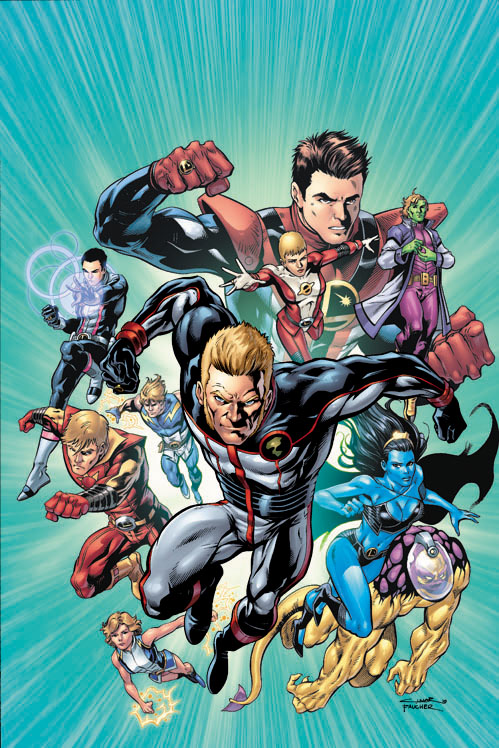 Matt Adler: Having been back in the writing saddle for a couple of months now, how does it feel?
Matt Adler: Having been back in the writing saddle for a couple of months now, how does it feel?
Paul Levitz: It's really nice to see the warm reception the material's gotten, especially the Legion. Any creative artist is always nervous in the wings. On the practical side, I think I've started to get a fairly smooth flow going, and I'm getting used to all the new technological changes.
MA: You've got quite a lot on your plate these days. Let's start with Legion of Superheroes; how did you wind up writing the team again?
PL: When I was getting up from my staff job's desk, the DCU was casting about for a new Legion writer for Adventure…an irresistable serependipity. The first script (originally done for an Adventure Annual) made Dan, Geoff and Brian decide to launch as a new ongoing.
MA: In the pages of Action Comics, Geoff Johns introduced the notion that Earth in the Legion's time has been swept by a wave of xenophobia that has alienated (sorry) them from the interplanetary community. Is this a theme you're looking to explore more of in your run?
PL: Absolutely. It's a powerful metaphor for the Clash of Civilizations (with apologies to Huntington) that's critical for our time, and worked out well to connect to the immigration/illegal alien debates that are raging. While I'm enough of an optimist that I hope that won't be problem by the 31st century, since it's been introduced, I hope to make good use of it.
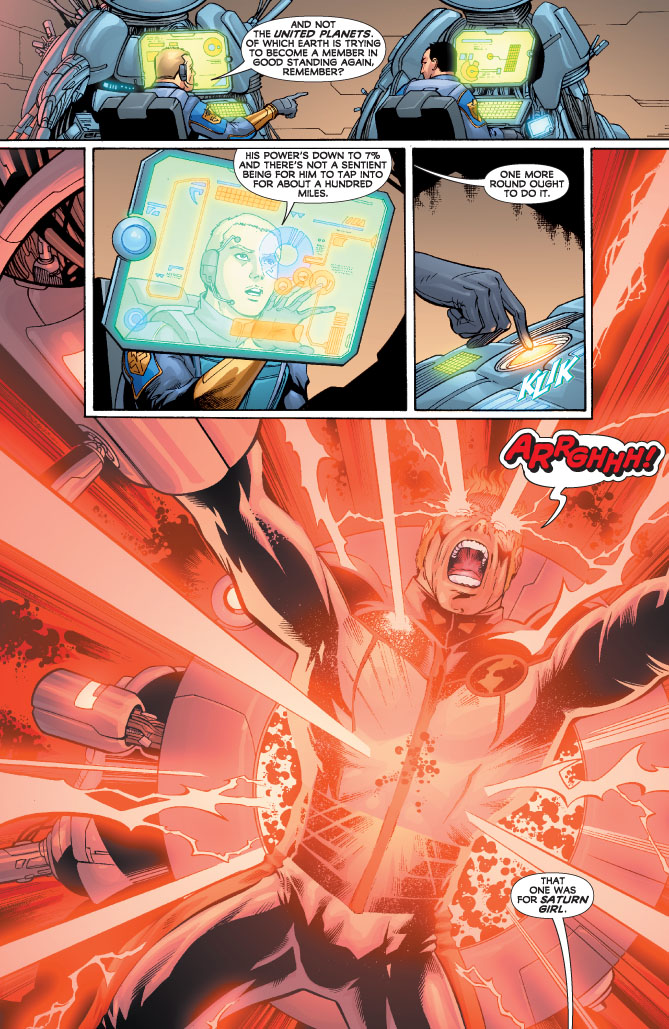 MA: We're also reintroduced in this story to Earth-Man, the xenophobic villain of Geoff's Legion story. Without giving too much away, based on what we see at the end of this issue, is it safe to say there may be redeeming qualities to Earth-Man buried beneath his bigoted persona?
MA: We're also reintroduced in this story to Earth-Man, the xenophobic villain of Geoff's Legion story. Without giving too much away, based on what we see at the end of this issue, is it safe to say there may be redeeming qualities to Earth-Man buried beneath his bigoted persona?
PL: Sure…in his mind, he wanted to do the right thing for Earth and his people, he just came to a disasterous conclusion about what it was. Whether he'll be able to transcend that will be fodder for future issues. I deeply hope readers will be surprised by some of the journeys he has to go through to see if his prejudices can be changed.
MA: The Legion's role as time travellers, and their association with the think tank known as the Time Institute gives you the opportunity to sow some seeds for the upcoming Flashpoint event in this issue. Is this something we'll be seeing more of in the issues ahead, as we build up to it?
PL: That'll be up to Team Flashpoint.
MA: The Legion is known as a challenging book to work on, particularly for artists, because of its large cast. What do you think of how artist Yildiray Cinar is handling it so far?
PL: I think Yildiray's doing wonderfully. He's gotten a very personal feel for several of the characters already (Brainy and Saturn Girl, particularly), and is building interesting body language/acting for several others, as well as doing very well on some of the more spectacular action sequences. I hope we get to work together for a long time.
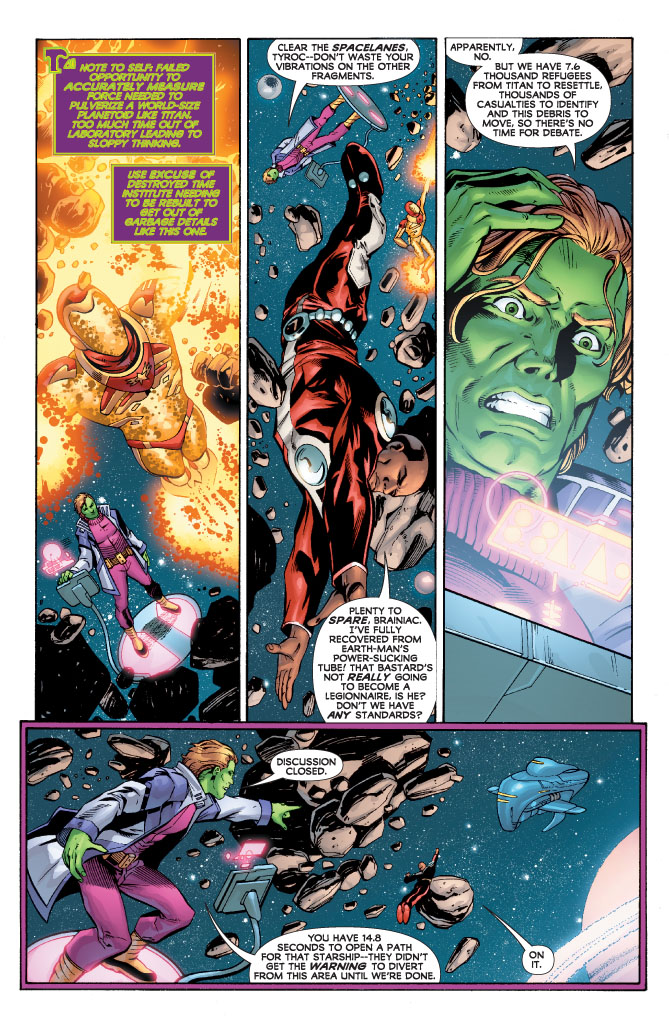
MA: From a writer's perspective the book also must present its own set of challenges. How do you find the characters' voices in such a diverse cast?
PL: The large cast is the joy of writing the series–there's always someone whose life you can screw up, and create drama. Balancing the appearances to give everyone some stage time is always a problem, but one I enjoy.
MA: I notice in the first issue we get a number of scene transitions to introduce what initially seem to be unrelated subplots; we start with Earth-Man, move to Titan, then on to the Time Institute, and then to Oa, but as the issue goes on, they all start to tie together in a way that makes sense. How do you juggle that?
PL: Carefully? I block out each issue in a sort of flow chart, playing with the ideas and scenes I want to get in…and now that trade collections are common, I'm trying to get used to considering that aspect as well. The threads introduced in #1 won't all be wrapped by the end of the first arc in #5, but meaningful progress will be made on most…and your list doesn't include several threads that started in the issue.
I think that if I have a distinctive skill as a comics writer, it's that sort of storytelling: putting many plots in motion, and connecting them in expected and unexpected ways.
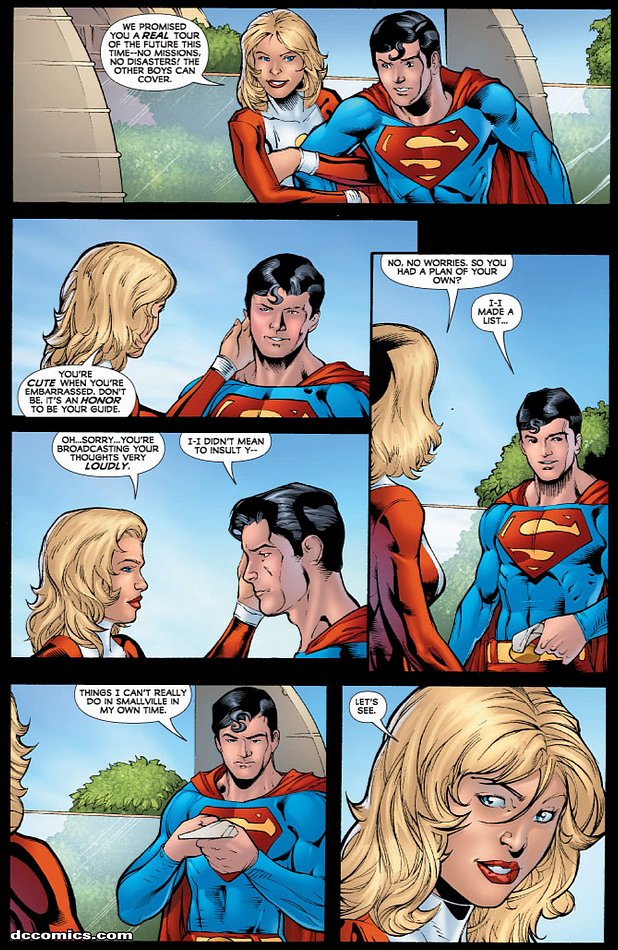 MA: Moving to Adventure Comics, this book deals with the Legion in their younger years. They come across, at least to me, as a little less cynical, a little less world weary, a little more carefree. Are you conscious of writing the characters differently between the two books?
MA: Moving to Adventure Comics, this book deals with the Legion in their younger years. They come across, at least to me, as a little less cynical, a little less world weary, a little more carefree. Are you conscious of writing the characters differently between the two books?
PL: If you write someone the same at 18 as they are at 25 (for example), you haven't explored the character very deeply. I hope I'm able to take advantage of the differences to get some interesting story material. #518's "Saturn Rising" certainly touches on a moment in Saturn Girl's life that could never occur a few years later.
MA: You also get to chronicle the adventures of a young Clark Kent, AKA Superboy, as he hangs out with the Legion in Adventure Comics. What's appealing to you about writing Clark in this stage of his life?
PL: I like this stage of Clark–in many ways younger and more the farmboy than the Superboy I used to write in Legion. He's more capable of surprise, embarassment, and less comfortable with being an icon. We'll see what I can do with that.
MA: Finally, you've taken over the writing chores on Superman/Batman. The debut arc features a dual track story set on an alien world as well as Earth, and in both of those settings, it seems like we're dealing with themes of worship, or at least faith in a higher power. What are you looking to explore here?
PL: This arc looks at a certain relationship of man to god: Luthor's efforts to play god, both in the lives of our heroes, and in the destiny of a world; Superman's discomfort with being treated as a god (and Lois' outrageous dilemma of being persecuted for shunning a god for a mortal); and even Batman's concern for the religious figures in Gotham. It's not a deep exploration of religion, or faith, but it draws on themes of both.
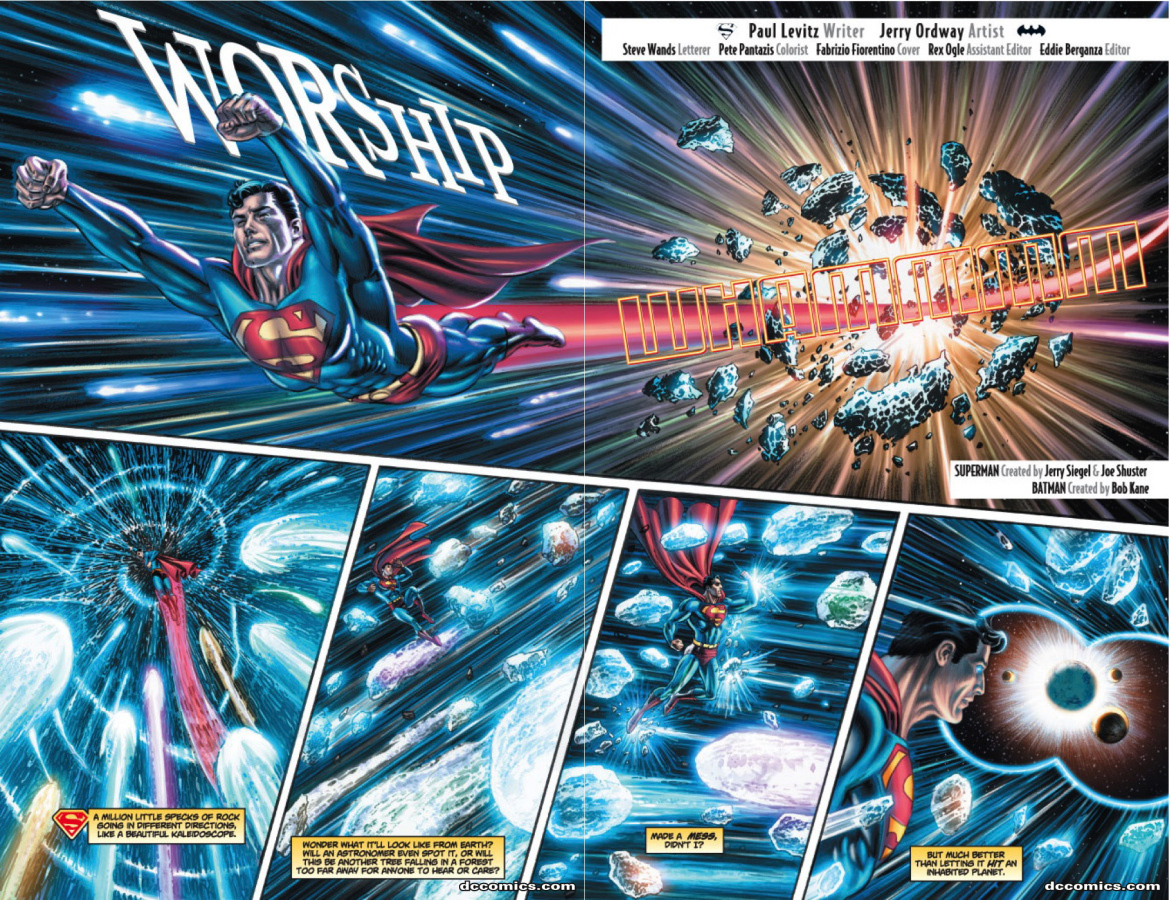 MA: Joining you on this arc is legendary artist Jerry Ordway. His art is always beautiful, but it looks so radically different here. Can you tell us anything about what he did to achieve this?
MA: Joining you on this arc is legendary artist Jerry Ordway. His art is always beautiful, but it looks so radically different here. Can you tell us anything about what he did to achieve this?
PL: Jerry describes it as inkwash, and it is absolutely beautiful. You'll have to ask him how he pulls it off though…in the modern technical world I can't be sure.
MA: Will you be continuing on Superman/Batman?
PL: Not as the regular writer, but I may come back for another arc. Depends on whatever other assignments come along.
MA: This may be crazy to ask, given all of the above, but are you working on anything else these days?
PL: I've finished the first draft of 32,000 words for Taschen's 75 Years Of DC Comics: The Art Of Modern Mythmaking. The book's primarily an art book (and an incredible visual feast), but I provide a narrative history of DC to introduce a context for it all. Found a few undiscovered facts, and had a ball.
Then I've been enjoying preparing to teach this fall. I'll be starting with a course at Manhattanville College, a craft-oriented course on writing for multiple media. To plan it out I've been re-reading some books, discovering others, and considering how to cover a lot of ground in a short time. Never having taught more than a guest lecture, it's been a fascinating intellectual challenge.
More projects to follow, but probably not for a little while.
Matt Adler doesn't see why we have to wait 1,000 years for time travel. It's time travel. Shouldn't we already have it?


I don’t know if there’s a writer in the business that’s better than Levitz at juggling multiple plotlines.
I hope he writes LSH forever.
That Taschen book looks amazing.
Excellent interview. Props to Mr. Levitz for tackling the Legion. That is a tough book to write (well) due to the large cast of characters which must be juggled. Looking forward to seeing where he takes it.
I am really looking forward to that Taschen book. Thanks for the link, I couldn’t find anything else about since it was announced.
Really happy to have Mr Levitz back at the keyboard – onward & upward, sir! And that Tashen book – *drool*
Make that "Taschen" – d’oh!